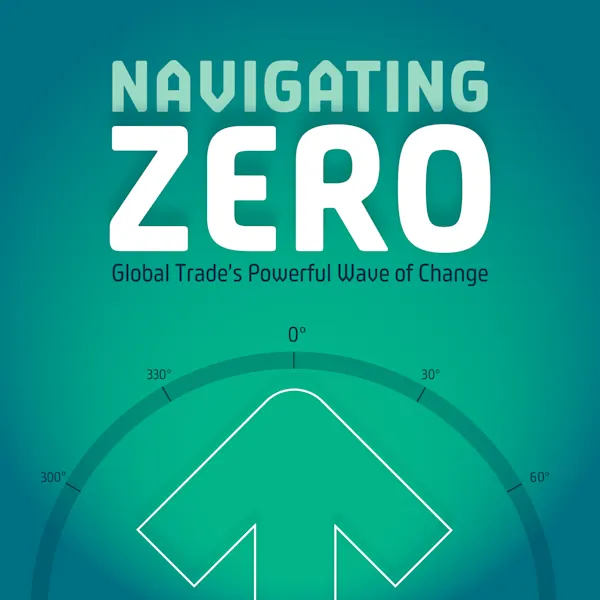Navigating Zero
If you are a gamechanger or professional within the shipping industry, who wants to drive change and make global trade green, this is the podcast series for you.
Listen on: Apple Podcasts | Spotify | Google Podcasts | Pocket Casts | Amazon Music
Navigating Zero - Global Trade’s Powerful Wave of Change is a podcast from ZeroNorth that explores the significant challenges facing the shipping industry on its journey toward a green future. The world is in a climate crisis, and all industries must do their part to reach zero emissions. Maritime trade is critical to today’s society but is also responsible for roughly 3% of all greenhouse gases. A future where global trade reaches zero is possible, but how do we actually get there?
In each episode, Lora Jakobsen, Chief Sustainability Officer at ZeroNorth, will sit down with global thought leaders and ask the difficult questions: How do we accelerate decarbonisation? What are the barriers to success? And what are the innovative solutions to the challenges we face in sustainable shipping?
Navigating Zero is for anyone who is interested in learning how the world works and to those who want to delve into different perspectives for the solutions to reduce CO2 emissions.
From Risk to Reward - Financing the Journey to Zero, with BCG’s Vinay Shandal
In this episode of Navigating Zero, host Lora Jakobsen is joined by Vinay Shandal, Global Head of Sustainable Investing and Senior Partner at Boston Consulting Group (BCG), to explore the financial architecture required to decarbonise global trade.
As the head of BCG’s sustainable investing practice, Vinay works with the world’s largest asset owners to scale investments in the energy transition. He explains that reaching zero is not just a technological challenge, but a "labeling problem" in finance. Many high-impact projects carry characteristics of venture, private equity, and infrastructure all at once, requiring a more flexible and collaborative approach to capital deployment.
Vinay emphasises that a significant portion of the transition is already economically viable. 50% of global emissions could be addressed with technology that is already "in the money." Decarbonisation doesn’t have to be a cost center — it can be a massive profit driver. He also discusses the importance of future-proofing value chains by embedding climate risk into every strategic decision — ensuring that assets remain resilient in an increasingly volatile environment.
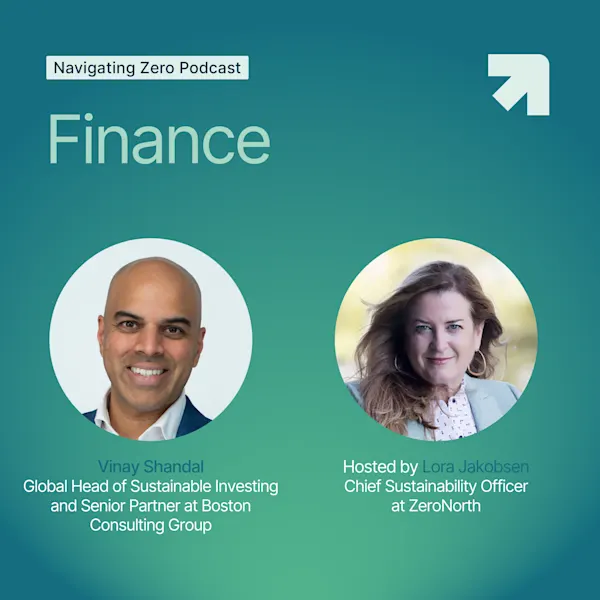
Could Nuclear Power Rewrite the Future of Shipping? With Mikal Bøe, from CORE POWER
The diesel engine has shaped the modern world, powering global fleets and enabling world wide trade. But is it time for a change to rethink the system and consider nuclear?
In this episode, Lora Jakobsen sits down with Mikal Bøe, CEO of CORE POWER, to explore what it could take to rethink maritime propulsion through advanced nuclear technology. The conversation goes beyond engineering, covering the commercial and regulatory architecture required for deployment, including insurance, civil liability agreements between countries, and the realities of port access.
Looking beyond the vessel itself, we explore how nuclear-powered ships could potentially supply electricity while in ports, and what that might mean for ports and terminal operations. Lastly, Mikal addresses the question that always comes up: waste. He outlines how nuclear energy has the full lifecycle responsibility built into the industry, and why newer reactor approaches could turn parts of existing waste streams into usable energy.
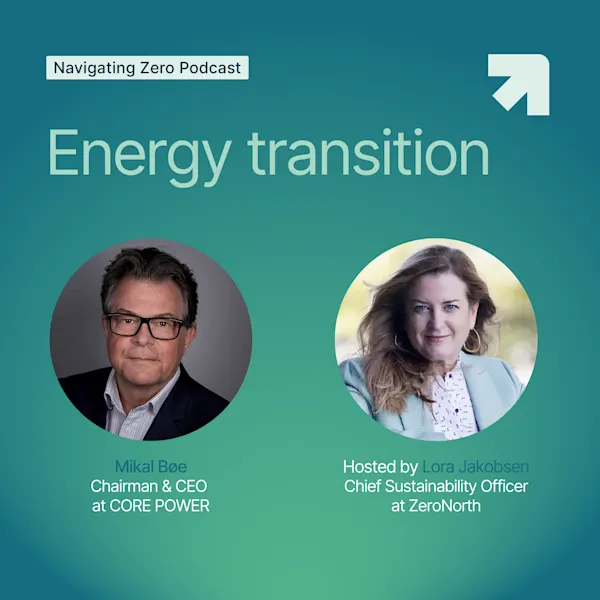
New Paths for Leadership in Trade, with GMF’s Johannah Christensen
Just days after the IMO postponed the Net Zero Framework, industry leaders gathered at the Global Maritime Forum’s (GMF) annual summit in Antwerp. What began in shock and disappointment quickly turned into renewed determination.
Johannah Christensen, CEO of GMF, joins host Lora Jakobsen to unpack the road ahead. The discussion reveals that while a global policy framework remains a subject of work, the maritime industry's innate entrepreneurial spirit is its greatest strength. This fragmentation paves the way for new alliances and collaborations.
Johannah advocates for stronger collaboration to close investment and policy gaps. She highlights how practical frameworks like green corridors are helping turn ambition into real-world implementation.
The conversation is a powerful reminder that while the ride is bumpy, the transformation is already happening and the next decade will define who leads and who lags behind.
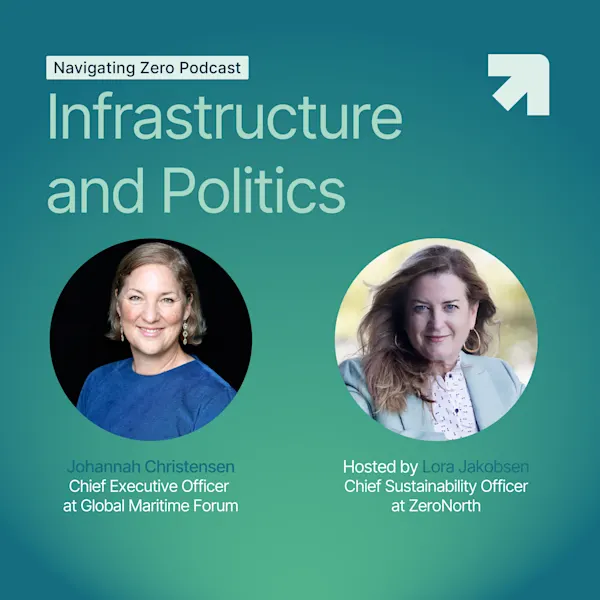
What now? After the IMO, the critical role of fuel suppliers in the energy transition with Maria Skipper Schwenn from Bunker Holding
When the International Maritime Organization (IMO) postponed adoption of its long-awaited Net Zero Framework, the decision shook up power dynamics and strategies across the industry.
Maria Skipper Schwenn, Director of Public Affairs at Bunker Holding, joins host Lora Jakobsen to provide a clear-eyed analysis of the geopolitical pressures that upended the vote and explains why the industry must now navigate a "regional patchwork" of varying regulations. Maria brings a breadth of experience on both sides of the table: in political and commercial associations, in Brussels, for Danish Shipping, and at Bunker Holding, the world’s largest bunker supplier.
Beyond the IMO, the conversation highlights the pivotal role of the bunker sector in accelerating the transition by building new partnerships and delivering low-carbon fuels safely and reliably worldwide. Tune in to understand the new commercial realities and the unique opportunity for suppliers to drive progress.
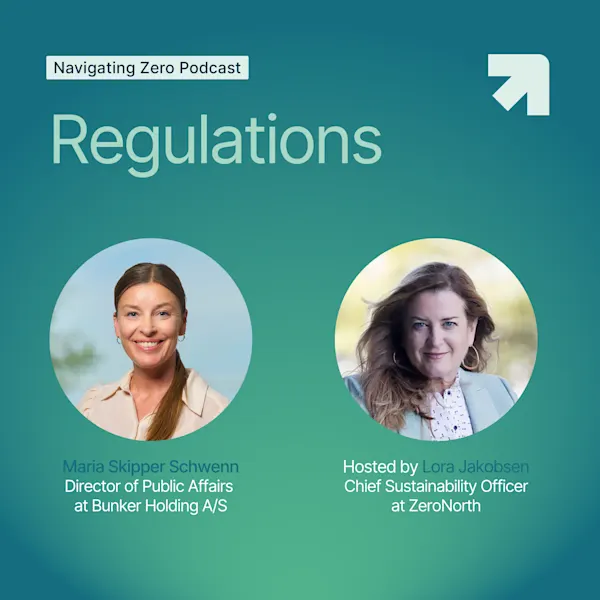
The Argument for Regulatory Ambition, with Aoife O’Leary, from Opportunity Green
Achieving zero emissions is a systemic challenge, requiring a complete overhaul of the legal and regulatory frameworks.
Aoife O’Leary, CEO and Founder of Opportunity Green, joins host Lora Jakobsen to discuss the path forward, especially following the recent IMO decision to delay the global greenhouse gas pricing mechanism. Aoife makes a bold case for why ambitious regulation is the most efficient and effective strategy for the industry. Drawing on her law background, Aoife argues that true business certainty is found only in bold commitments aligned with climate science, as incremental steps risk obsolescence.
The conversation explores where carbon pricing revenues could help the most, why policy must accelerate the adoption of fuels like hydrogen and ammonia, and how existing laws can be reinterpreted to speed up change without waiting for new treaties. Tune in to hear why bold, global regulation is the key to achieving zero.
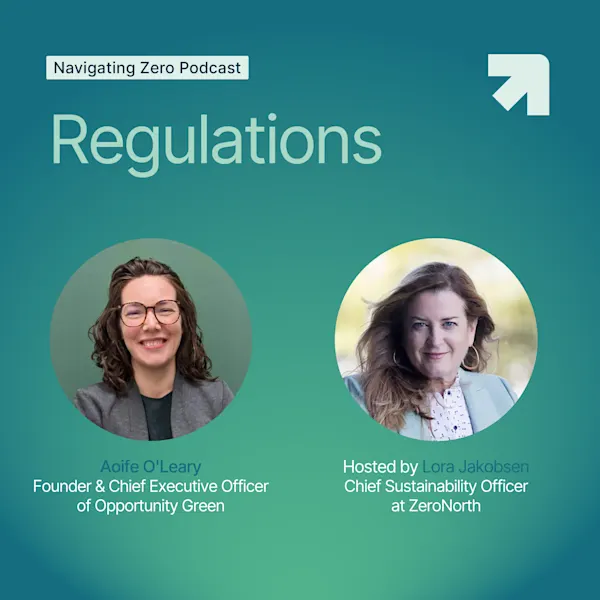
Future-proofing Maritime: Today’s Leadership is Tomorrow’s Competitive Advantage with Alexander Saverys
What does it mean to truly future-proof shipping?
Alexander Saverys, CEO of CMB.TECH, is one of the industry's most forward-thinking leaders. He's betting early on technology, innovation and fuels. He’s forging a new clean fuel supply chain to accelerate the next propulsion revolution.
In this insightful episode, he and host Lora Jakobsen unpack CMB.TECH’s strategy, which balances decarbonisation with diversification. Discover why cultural change and flexibility are critical to the energy transition, and how investing now will determine who thrives in the decades ahead.
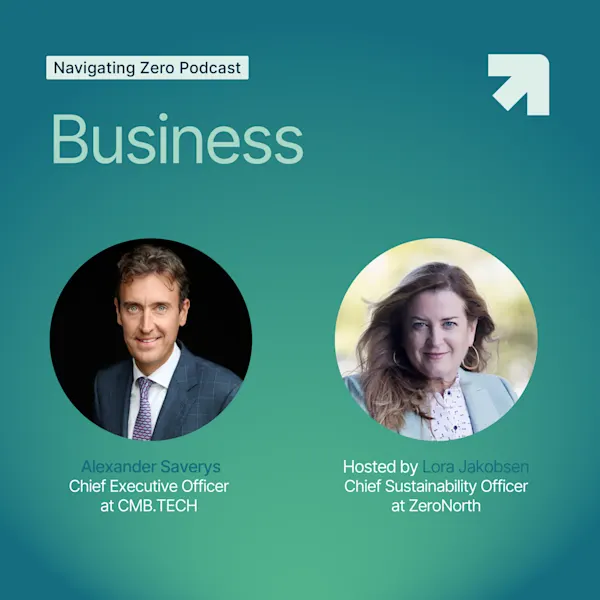
Industry Practices and Building Resilience in the Age of Uncertainty, with Julian Bray from TradeWinds
In an "age of uncertainty," what does it take for the maritime industry to build true resilience and adapt for the future?
Julian Bray, Editor-in-Chief of Tradewinds and Publisher at Dagens Næringsliv, joins host Lora Jakobsen to kick off Season 3 of Navigating Zero. With decades of experience, Julian offers a unique vantage point on the industry's ongoing evolution, from geopolitical shifts to the urgent push for decarbonisation.
This episode unpacks how the shipping industry is responding to turbulence and how cargo owners are critical in accelerating real change. Tune in to find out why uncertainty can be an opportunity for global trade.
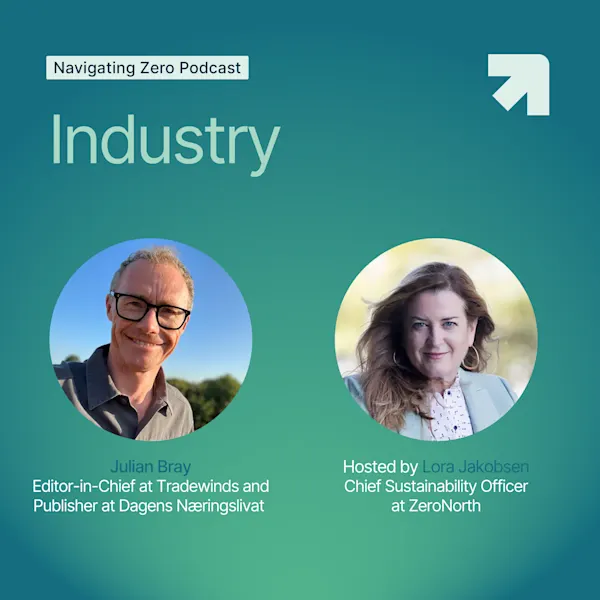
Banking's Role in Maritime Sustainability with Michael Parker and Paul Taylor
In the final episode of Navigating Zero Season 2, we’re joined by Michael Parker, Global Head of Shipping at Citigroup, and Paul Taylor, Global Head of Maritime Industries at Société Générale. Together, they explore how strategic collaboration between banking and shipping is driving decarbonisation efforts.
This episode explores the expanded regulations which are unlocking opportunities for green infrastructure, the Poseidon Principles’ role in setting new transparency standards, and innovative solutions to bridge the funding gap for green fuels, such as green market maker initiatives and sustainability-linked loans.
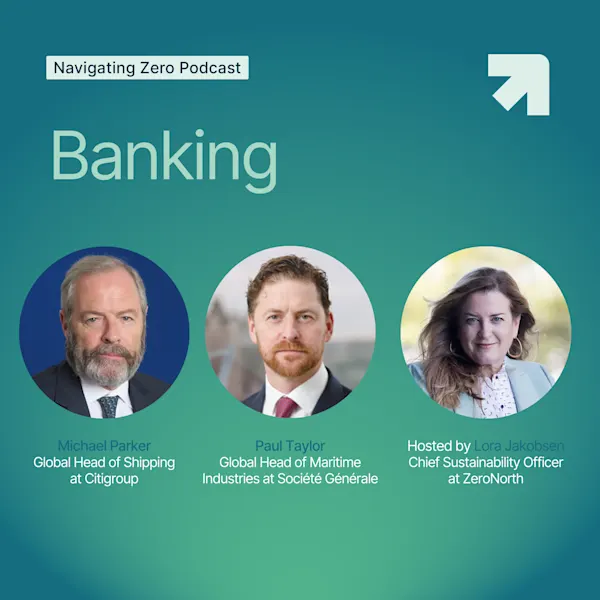
Insights & Outlook for the Economy and Global Trade with James Pomeroy
James Pomeroy, Global Economist at HSBC shares his insights and outlooks for the global economy which he says are both mixed and uncertain depending on the region and sector we look at. Amidst this complexity, he reveals the long-term trends poised to shape the future of global trade.
From the demographic trends reshaping consumer demand in Asia to the exponential growth of renewable energy investment, James highlights how long-term shifts are redefining global supply chains and trade flows. He also delves into the growing influence of technology and sustainability in shaping economic futures, offering an optimistic view of the opportunities ahead despite ongoing uncertainties.
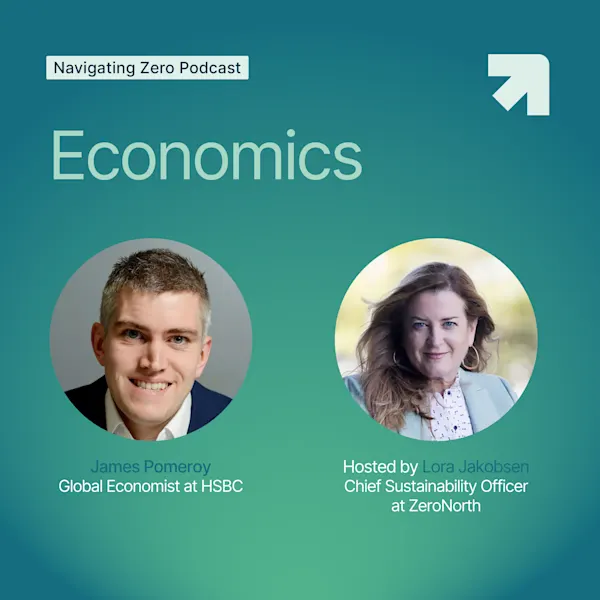
Pragmatism as a Strategy in the Energy Transition with Mikael Skov
Tanker markets are highly influenced by geopolitical upheaval and macro-economic trends. In such a volatile environment, how can companies meet current demands, while staying on track advancing the energy transition? Mikael Skov, CEO of Hafnia, with nearly 40 years in the industry, shares his unique and pragmatic perspective on the energy transition.
In this episode, Mikael explores how companies can take a steady, adaptable approach to decarbonisation, balancing today’s demands with long-term sustainability goals. He highlights the importance for shipowners to improve the environmental footprint of their current assets, for example through technology solutions and using data to make steady, measurable improvements, while working alongside customers for a long-term transition — a strategy he believes will help Hafnia achieve lasting impact. Mikael also delves into how market leaders driving technological developments can benefit smaller organisations and the industry at large.
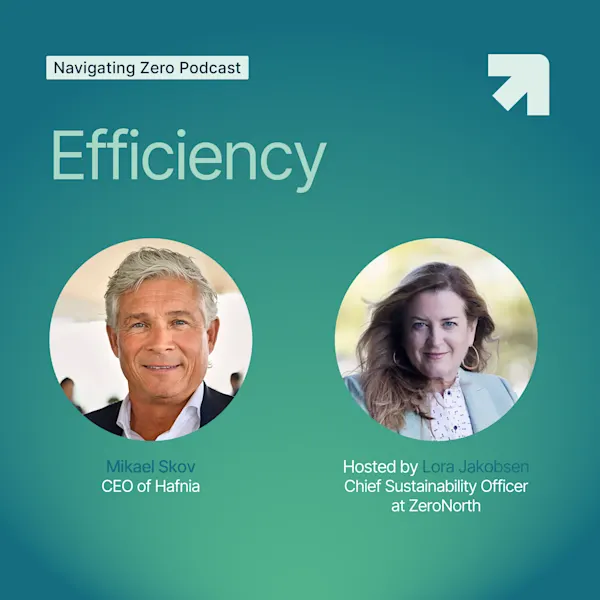
European Parliament and the Green Transition with Rasmus Nordqvist
Explore the role of politics in the green transition with Rasmus Nordqvist, a newly elected member of the European Parliament for the Danish Socialist People’s Party (SF). Known for his environmental advocacy with The Alternative, a green and pro-European party, and now the Socialist People's Party, Rasmus brings valuable insights on strategic political engagement for sustainability.
In this episode, Rasmus explores the importance of cross-sector collaboration and the role that legislative bodies play in propelling environmental agendas forward. Rasmus also provides a behind the scene glimpse into his experience and reflections on why the European Parliament’s ways of working across its 27 member states is able to set regulations which inspire other countries to follow suit.
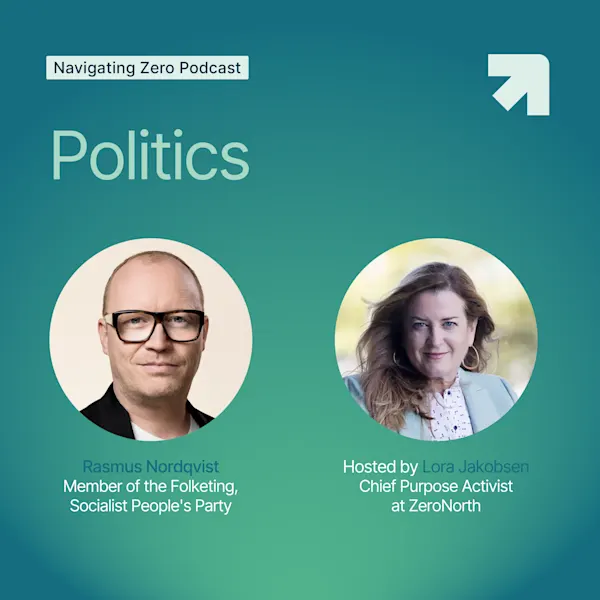
Building a Sustainable Business Case with Pia Heidenmark Cook
How can businesses effectively integrate sustainability into their core strategies? Pia Heidenmark Cook, known for her influential role at IKEA and her expertise across various sectors, shares her insights.
This episode delves into Pia's strategic approaches to influencing change within large organisations, utilising data to support sustainability, and setting actionable and impactful environmental targets. The discussion provides valuable insights into how sustainable practices can align with and even enhance business objectives, driving the broader adoption of green initiatives across industries.
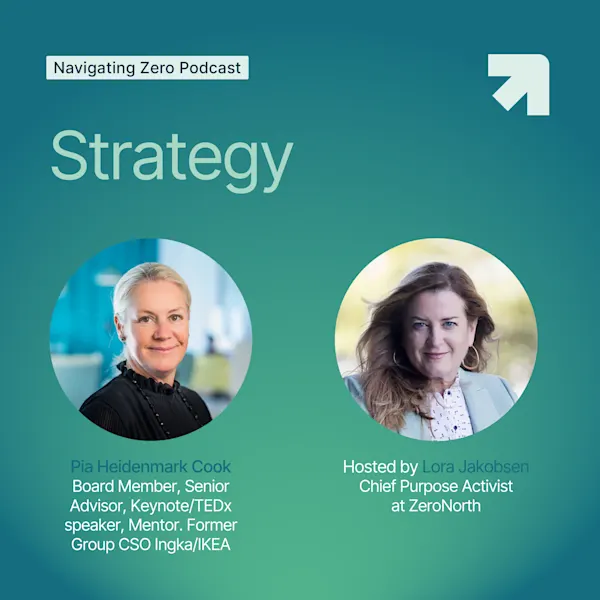
Dual Fuel Engines and the Green Transition with Bjarne Foldager
As the maritime industry seeks sustainable solutions, dual fuel technologies emerge as a critical bridge to a greener future. These innovative technologies enable ships to operate using both conventional and alternative fuels, reducing emissions and paving the way for more sustainable global trade practices.
Bjarne Foldager, Senior Vice President and Head of Two-Stroke Business at MAN Energy Solutions delves into the evolution and impact of dual fuel engines. With over three decades of experience in the field, Bjarne explores the adoption of these engines across the global fleet and discusses the role of regulations and market demand in accelerating the maritime industry’s green transition.
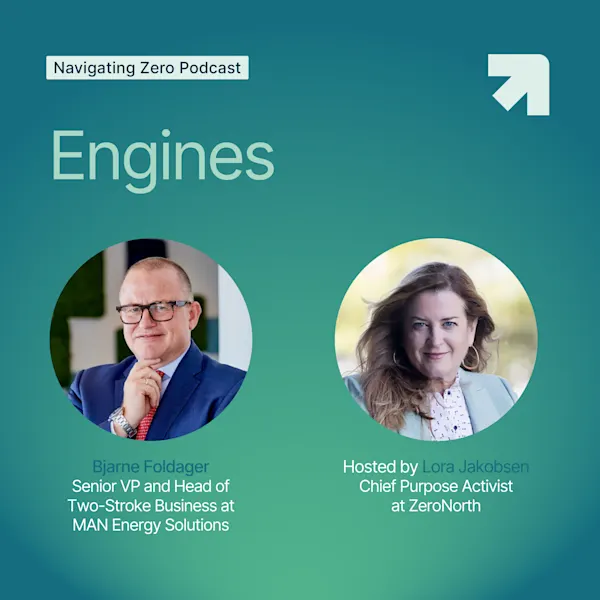
Science and the Evolving Intersection of Global Trade, Policy, and Ecological Limits
The intersections of global trade, policy, and ecological limits are discussed by Katherine Richardson, a professor of Biological Oceanography, leader of the Sustainability Science Centre at Copenhagen University and former chairman of the Danish Climate Commission. She delves into the concept of planetary boundaries and planetary commons, highlighting how to focus on biodiversity alongside climate change.
Exploring how understanding and respecting planetary boundaries is crucial as we navigate environmental challenges, she illuminates how sustainable practices can lead to a stable and healthy planet. This discussion is pivotal for anyone interested in how scientific insights can guide us toward a sustainable future.
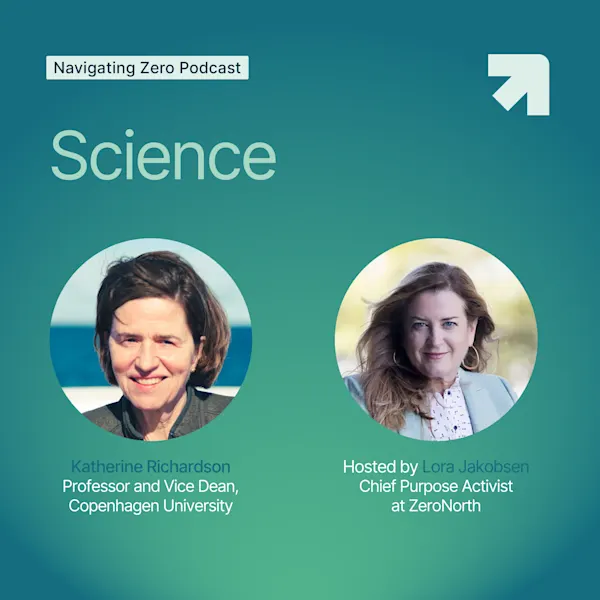
Container Shipping and the Green Agenda with Lars Jensen
The container shipping industry faces unique challenges in transitioning to greener practices. External factors have spurred rapid growth and profit since the late 20th century. Yet, major disruptions such as the 2008 financial crisis, the COVID-19 pandemic, and the 2024 Red Sea Crisis have significantly impacted the industry. Amid these upheavals, how can container shipping advance its green agenda?
In this episode, Lars Jensen, CEO and Partner at Vespucci Maritime, offers an in-depth exploration of how the industry has adapted to monumental changes, including those from recent global crises. He discusses the evolution of business models to meet modern challenges and delves into the complexities of navigating new regulations, such as the EU’s carbon taxation scheme, which pose both challenges and opportunities for the green transition.
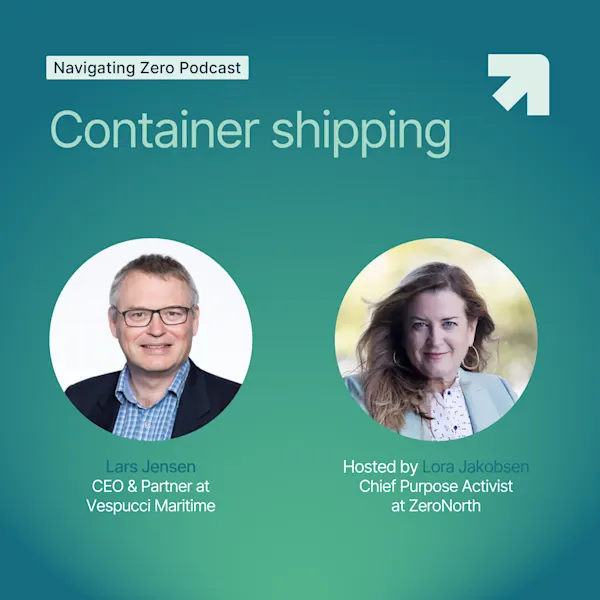
Season 2, Episode 1: Tristan Smith on Research, IMO and how to reach the 2030 goals
To meet increasingly stringent IMO targets for 2030 and 2040, the shipping industry must evolve by adopting greener energy sources and optimising efficiency. But is the industry prepared for these changes?
In this episode, Tristan Smith, Associate Professor at the UCL Energy Institute and a delegate to the IMO from RINA and IMarEST, offers an insider’s perspective on necessary strategic measures for maritime decarbonisation. He emphasises the importance of grounding global regulations in solid industry research and real-world applicability to ensure driving meaningful change. Tristan also provides a behind-the-scenes look at IMO negotiations, sharing insights into how international regulations are shaped and the complex challenges that research helps to unravel, paving pathways toward zero emissions.
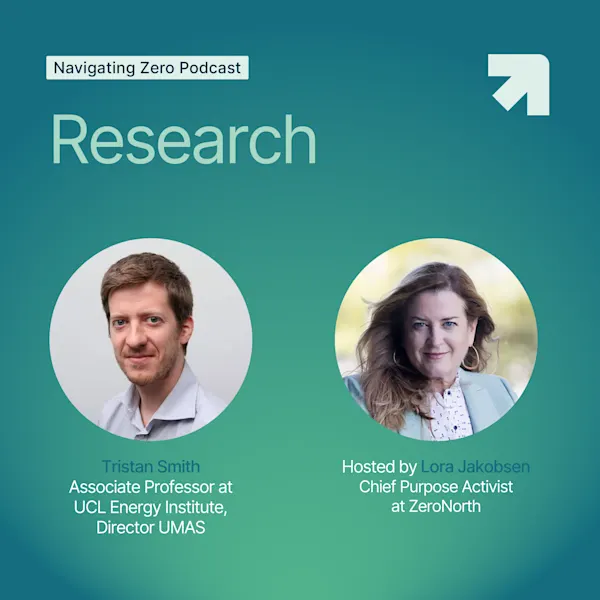
Corporate Voices: Political Strategies for Climate Success
In this special episode of Navigating Zero, host Lora Jakobsen takes us to Folkemødet on the beautiful island of Bornholm, Denmark. This unique annual political festival aims to bridge the gap between citizens and decision-makers. Lora engages in compelling conversations with top business leaders and industry experts about their strategies and challenges in achieving zero emissions in their respective fields. Each guest discusses why they came to Folkemødet, what megatrends influence their thinking, and how collaboration and conversation with politicians benefit their work.
This episode features conversations with Bjarne Foldager, Senior Vice President and Head of Two-Stroke Business at MAN Energy Solutions, Laura Kemp-Pedersen, Chief Sustainability Officer of McDonald's Nordics, Søren Meyer, CEO of ZeroNorth, and Jenny Braat, CEO of Danish Maritime.
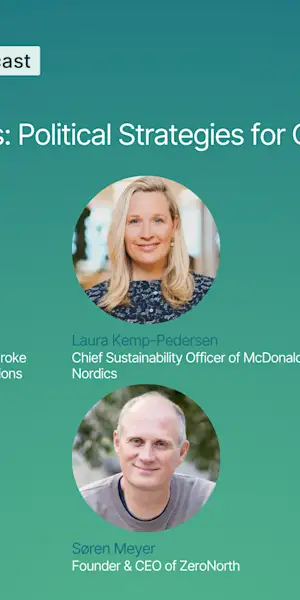
Ship Building and Policy Changes with SEA Europe’s Christophe Tytgat
In an industry as foundational and globally interconnected as shipbuilding, understanding the currents of change is essential for navigating towards a sustainable future.
In this episode of Navigating Zero, Christophe Tytgat, Secretary General of SEA Europe and CESA, a formidable advocate for European shipyards and maritime equipment manufacturers, dissect the multifaceted challenges and opportunities facing the shipbuilding industry.
Throughout their discussion, Christophe and Lora delve into the geopolitical nuances impacting shipbuilding, from the ongoing conflict in Ukraine to the relentless competition from Asia. They explore how these external pressures intertwine with internal industry dynamics, such as the digital revolution and the growing maritime talent gap, to create a complex landscape for shipbuilders.
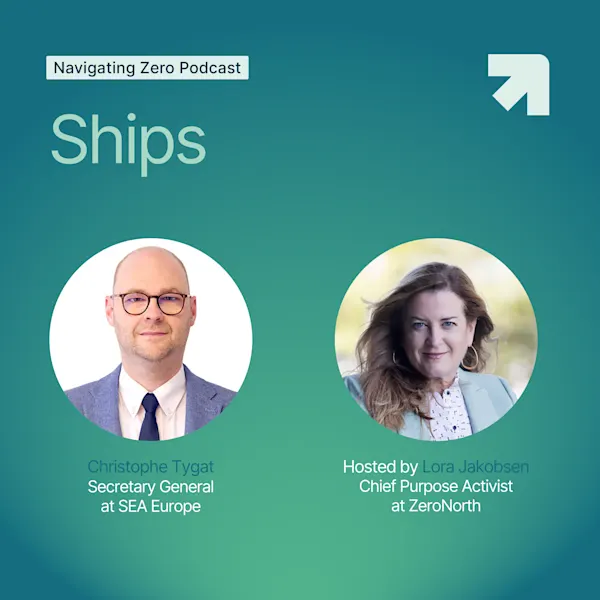
The Digital Port Revolution with the Port of Rotterdam’s Saskia Mureau
It's hard to underestimate the importance of ports in our world. They are vital links between land and sea, offering unique opportunities for spearheading digital transformations and green technologies. This pivotal role underscores their potential to reshape maritime logistics for a zero emission future.
In this episode, Saskia Mureau, Director Customer Digital at the Port of Rotterdam discusses the critical role of ports in the green transition, her leadership in establishing the Rotterdam-Singapore digital and green corridor, and the need for improved digital literacy to propel the industry forward.
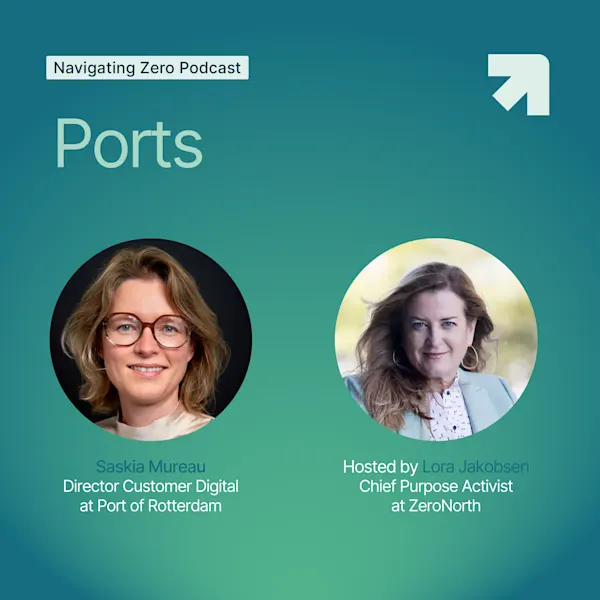
Acting for Future Generations with former Generations Commissioner Sophie Howe
A view that takes the needs of future generations into account is critical if we are to change our world for the better. But how can we push boundaries, and make different decisions today that benefit the lives of our children and grandchildren tomorrow?
In this episode, Sophie Howe, former Future Generations Commissioner for the Welsh Government, explores the transformative power of public policy, our collective responsibility to drive positive impact for the next generations, and how radical, forward-thinking can lead to substantial environmental progress.
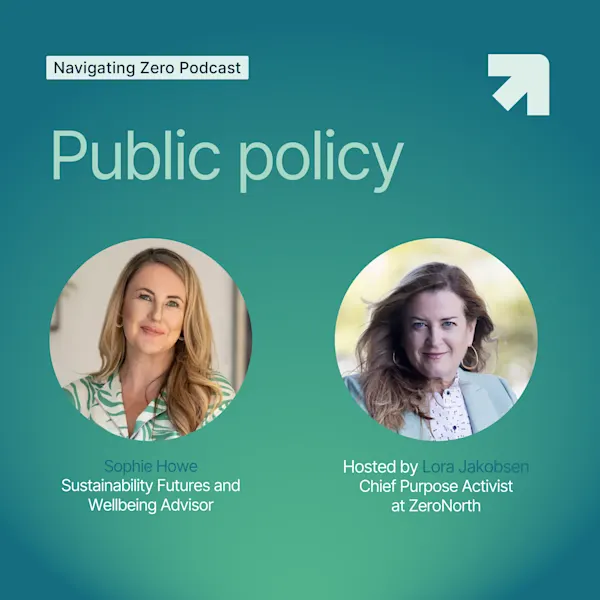
Technology’s Critical Role in Reaching Zero Emissions with ZeroNorth’s CEO Søren Meyer
Technology plays a critical role in the green transition. In the past, the complexity of the shipping industry – including the diversity of the global fleet, infrastructure constraints, and the economic impact of ‘going green’ – has prevented mass adoption of technological innovation.
In this episode, Søren Meyer, CEO of ZeroNorth, discusses the technology that is shaping the future of the green transition and why he thinks the change movement is critical to accelerate the maritime industry.
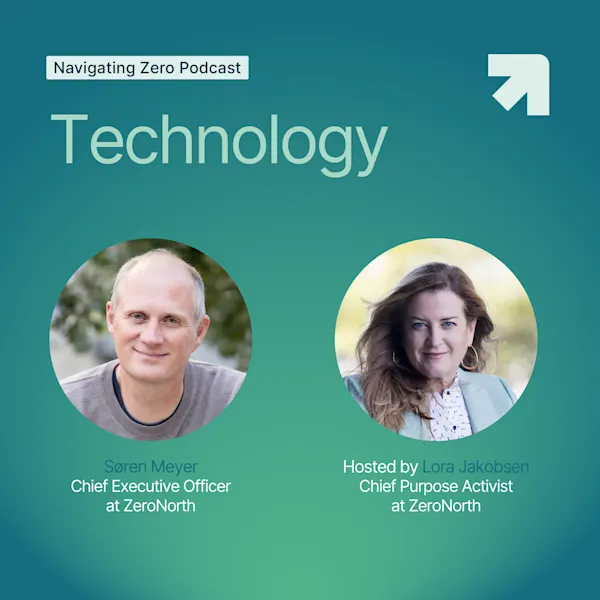
Charting sustainable paths for global goods transportation with A.P. Møller Holding's Robert Mærsk Uggla
In an era where our planet's resources are increasingly stretched thin, finding sustainable methods for the global transportation of goods becomes imperative. This challenge calls for innovative solutions to redefine the global supply chain to be in harmony with environmental sustainability, ensuring that future generations inherit a world where profit and planet coexist.
In this episode, Robert Mærsk Uggla, CEO of A.P. Møller Holding, explores the balance between the necessity of global trade and its environmental impact, the energy systems fuelling its transportation, and ambitious solutions that will lead us towards a sustainable future.
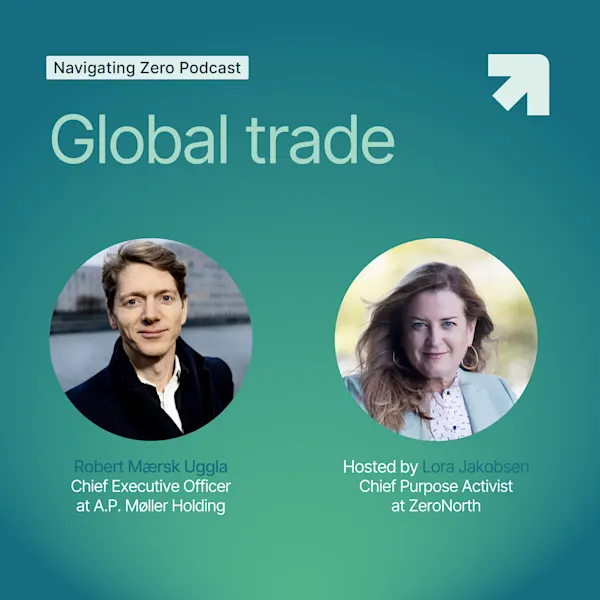
Bold Leadership with Lord John Browne, Chairman of BeyondNetZero and Former CEO of BP
What does it mean to lead boldly? It can involve making unpopular decisions to chart a new way forward. In our industry, it can translate to putting planet hand in hand with profit or finding innovative ways to put sustainability at the heart of strategy. It can also mean being able to see where today’s trends might lead us tomorrow.
In this episode, Lord John Browne, Chairman of BeyondNetZero and former BP CEO, discusses what inspired him to change BP’s direction during his tenure, the importance of incentivising change through bold leadership, and how his organisation is helping to finance the green transition.
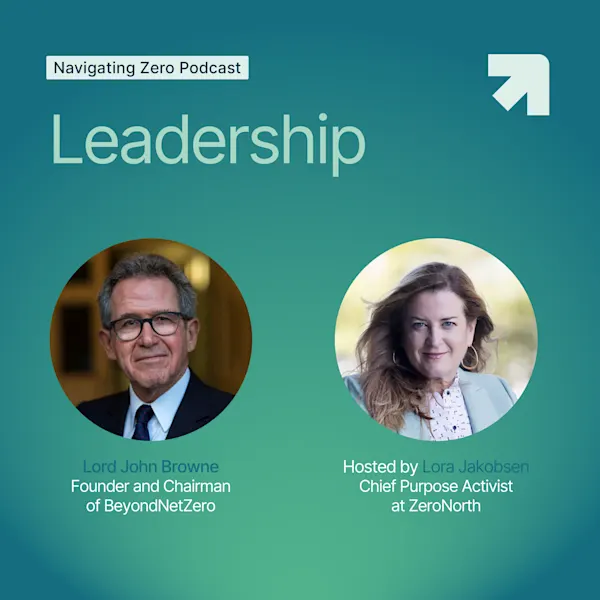
Data-Driven Digital Transformation with Google’s Danny Lange
Shipping continues to struggle with its data-driven digital transformation, perhaps due to it being a global industry with different regional capabilities, needs, mindsets, and conflicting incentives. These complexities may be why this industry has been slow to adopt technology and reap the benefits of machine learning and AI.
In this episode, Danny Lange, VP of BI and AI at Google, explores the dynamic between high-quality data collection and AI, uncovering the keys to steering the shipping industry towards a zero emissions future.
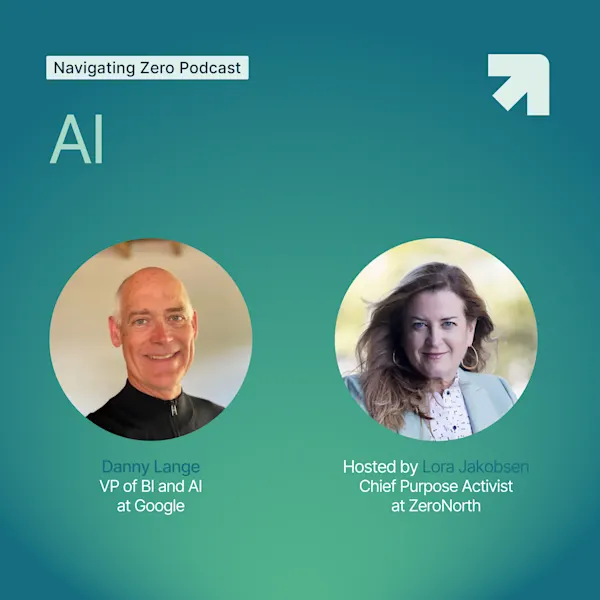
Transitioning to Future Fuels with Global Centre for Maritime Decarbonisation's Lynn Loo
Green fuels have the potential to move the dial on reaching zero emissions. However, the complex nature of overhauling fuel supply chains and a lack of infrastructure present a barrier for the shipping industry. It's essential that collaboration amongst stakeholders is expanded and made more transparent if we’re going to see a rollout of green and biofuels.
In this episode, Lynn Loo, CEO at the Global Centre for Maritime Decarbonisation (GCMD), discusses future fuels and the key actions that the industry needs to take to navigate to zero emissions.
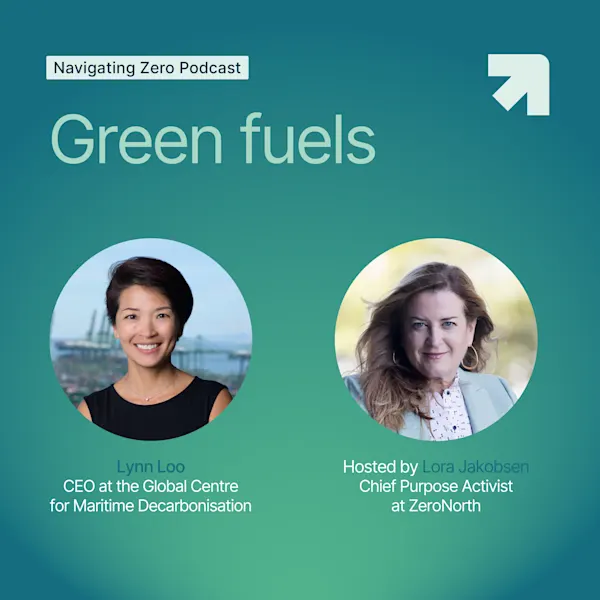
Ship Operators' Role in Leading Decarbonisation with Cargill’s Jan Dieleman
Enterprises that move cargo across the seas are well placed to influence the direction of sustainable shipping practices. They are the first movers, taking on the risk of testing new technologies and implementing new practices so that change can happen. On our path to zero emissions, we need to support the first movers who lead by example.
In this episode, Jan Dieleman, President of Cargill Ocean Transportation, shares his insights into the evolving landscape of global trade and sustainability, and the vital role that first movers play to drive industry change towards new technologies and practices.
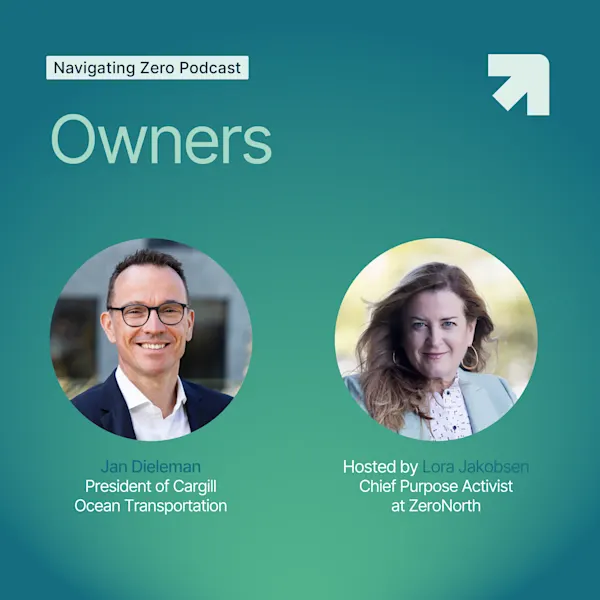
Global Trade's Critical Place in Our World with Lloyd's List's Richard Meade
In the first episode of Navigating Zero, we're taking you through some of the foundational concepts and facets of global trade. The objective of this show is to try to unravel some of the complexities of this industry and explore the actions it can take to reach zero emissions. To do this, we need to start at the beginning.
In this conversation, Richard Meade, Editor in Chief of Lloyd's List, discusses how he would define global shipping, the complexities of regulation and regulatory bodies, and what aspects he thinks are most important moving forward.
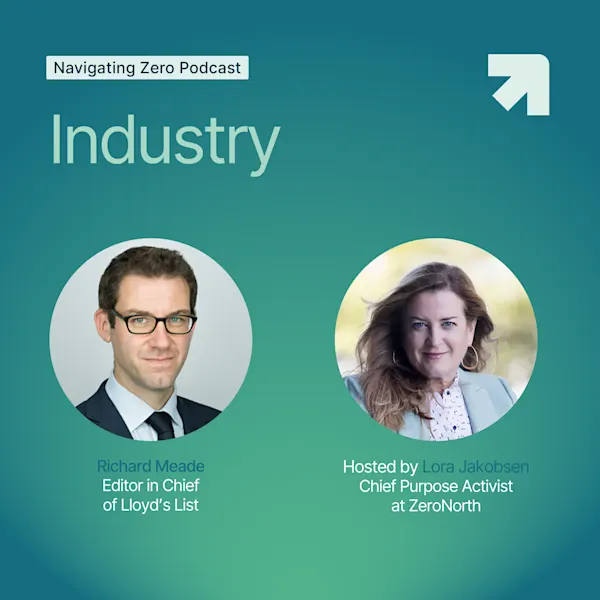
Welcome to Navigating Zero - Global Trade’s Powerful Wave of Change
The maritime sector accounts for roughly 3% of all global greenhouse gases. The world is in a climate crisis, and our industry needs to transition to zero emissions. But how do we actually get there?
Navigating Zero, a podcast from ZeroNorth, delves into why it's so complex to break down barriers and change the mindset of this historic global industry during its green transition.
In each episode, host Lora Jakobsen, Chief Purpose Activist at ZeroNorth, will sit down with thought leaders and global experts to explore the inner workings of global trade, its massive impact on our society, and the obstacles it faces as it navigates its way toward zero emissions.
